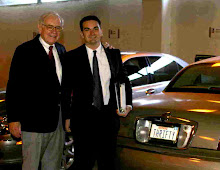I was asked this question during a job interview I had some six years ago with a St. Louis-based brokerage firm. I bombed it. And it has haunted me ever since. How could I fail to articulate a coherent response to such a simple question? Well, it’s complicated, so allow me to explain.
First of all, if the success of Warren Buffett were easily understood and replicable, clearly there would be many more wildly successful investors in the world, but of course there are not. While I concede that this observation comes dangerously close to efficient market theorist’s six-sigma explanation of Mr. Buffett’s success – that with so many coin-flipping investors you are bound to have an outlier like Buffett simply by chance – I do not think it is a null hypothesis that can easily be rejected. The truth is there are very few investors even in the same ballpark as Buffett. But why? Is it just chance?
Kind of. Mr. Buffett has explained it by acknowledging that he is “wired” in such a way that makes him very adept at capital allocation. This might be a disconcerting notion to some as it implies that you either have it or you don’t.
But what is “it” anyway? To me, it is a combination of an array of characteristics, some very learnable, some less so. The learnable ones are characteristics every CFA charterholder probably has. These are things like strong analytical skills as well as simply a good knowledge of the financial markets. That is not especially hard to replicate. Moreover, with tens of thousands of CFAs in the world you would expect a few more Buffetts were this all it takes.
It is the less-learnable characteristics that set Buffett apart and this is where watching Warren Buffett the person may help the most. People who have spent time with Mr. Buffett notice two things. For starters, he reads – constantly. Sometimes he can spend his entire day reading, and it’s not just for pleasure. He reads because he is hungry for information that will make him a more successful businessman. Very few people have the drive Warren Buffett has.
Easy enough right? You are probably thinking, “Well if all I have to do to become a billionaire is read all the time then sign me up for the value investor’s book club.” Not so fast. A lot of people read a lot. The difference is Buffett’s memory. Not only does he read but he remembers everything he reads. Folks familiar with the man know how tremendous his memory is. Very few people have the memory Warren Buffett has.
The most important less-learnable characteristic Buffett possesses, though, is very uncommon. It is emotional discipline. By this I mean the ability to resist the natural human instincts of fear, greed, pride, regret and all the other irrational biases to which people are inherently inclined to succumb. I have been trying myself to master these biases for years and, let me tell you, it is tough. Even once an investor is cognizant of these biases he may find it extremely difficult to control them. I can’t let myself buy because stocks are going up (greed) or sell because they are going down (fear). I have to base my decisions entirely on an unbiased assessment of the underlying business. This is far easier said than done.
Several years ago the WSJ ran a story about entitled “Lessons From the Brain-Damaged Investor.” The article discussed studies in the field of “neuroeconomics,” a sub-field of the more general category of behavioral economics. Some of these studies suggest that brain chemistry itself can explain irrational financial decision making and that individuals with damage to the part of the brain responsible for controlling emotion actually make better financial decisions. A sample of brain damaged individuals more appropriately weighed risk and payoffs in a simple gambling game than a control group consisting of individuals with similar IQ but no brain damage.
No, I am not suggesting Warren Buffett has brain damage. Rather, I think he has an innate acuity to controlling emotions that most people do not. Perhaps some people have as much control over their emotions, but the number is probably small. Further, it is unlikely that such a person also has the intelligence, knowledge, ambition, memory and patience of Warren Buffett. Said differently, all the characteristics necessary to construct a master investor may exist independently in many different people, but the probability of them all existing in the same person is very low. Warren Buffett happens to be the only one to date.
Consider some of the other personal qualities that have contributed to Mr. Buffett’s success. He is very personable and pleasant. That certainly hasn’t encumbered his road to riches, as it took the personal relationships he had with the original investors in the Buffett Partnership for Mr. Buffett to get started. He is also very good at reading people, whatever you think “reading” them might involve. Just look at how many successful investments were in part due to his ability to assess the integrity of the business’s management.
So there you have it. Warren Buffett’s success is indeed the result of luck. But it is not the coin-flipping kind of luck that academics would like to believe. Rather, he is simply lucky to be endowed with all the requisite qualities that make for investment success. This begs the question, then, is it worthwhile to study what has made Mr. Buffett successful? Can we even hope to acquire the skills driving his success? Without hesitation, I would answer in the affirmative. Even if we cannot hope to ever be as wealthy or respected, any effort to be will make us both better investors and better businesspeople. Warren Buffett is the pinnacle of investing perfection. While we may never get to his level ourselves, we can still benefit from trying.

